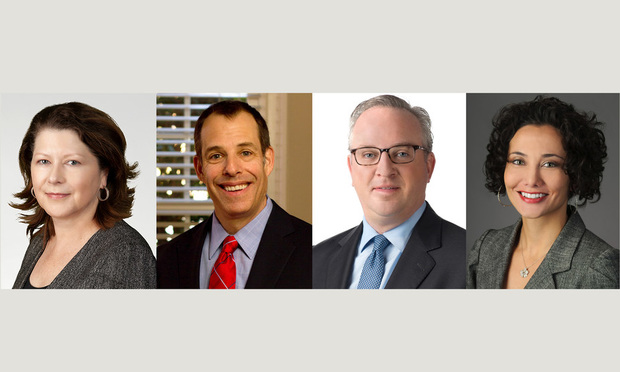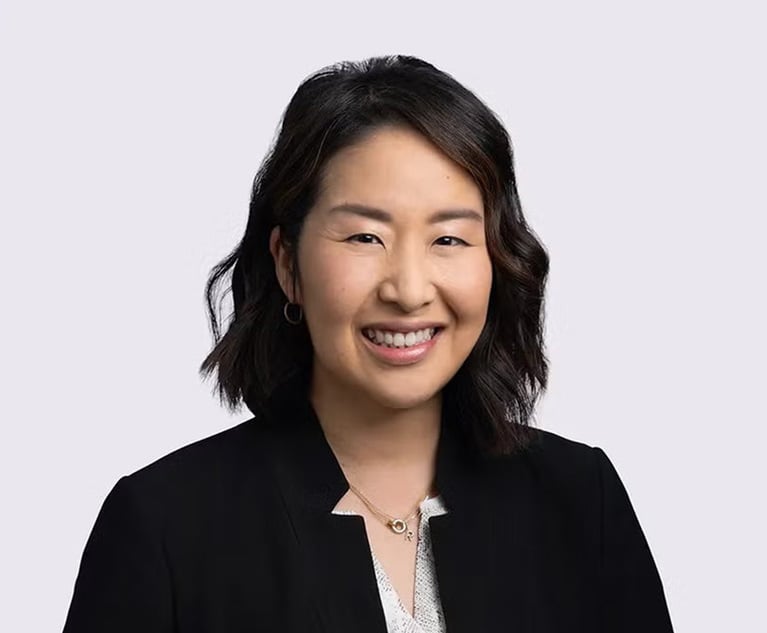As Pay Gap Widens, Some Firms Attract Associates With Other Incentives
Atlanta's large firms are using bonuses and a viable partnership path to lure in-demand associates.
September 11, 2019 at 04:30 PM
7 minute read
 L-R: Susan Campbell, recruiting manager with Holland & Knight, Stephen Stone of Stone Search Partners, Michael Hollingsworth, Atlanta managing partner for Nelson Mullins Riley & Scarborough, and Shannan Rahman of The Partners Group.
L-R: Susan Campbell, recruiting manager with Holland & Knight, Stephen Stone of Stone Search Partners, Michael Hollingsworth, Atlanta managing partner for Nelson Mullins Riley & Scarborough, and Shannan Rahman of The Partners Group.
The national wave of associate pay raises last year has further widened the compensation gap among law firms in Atlanta, with boutiques and regional firms struggling to attract and retain lateral associates because they can't compete on dollars.
But some Am Law 100 and 200 firms that pay somewhat below the top associate pay scale in Atlanta are successfully wooing top midlevel and senior associates by offering higher bonuses and the chance to actually make partner.
"Our platform allows for more flexibility, including bonuses," said Michael Hollingsworth, Nelson Mullins Riley & Scarborough's Atlanta managing partner. "We're an entrepreneurial culture."
Overall, competition is fierce among Am Law 100 and 200 firms in the Atlanta market for associate talent, with high demand across the market, according to recruiters and law firm leaders. Midlevel and senior associates in real estate, corporate and finance are sought after, while demand is softer for corporate litigation associates.
Real estate is the most in-demand practice area for firms from boutiques to nationals and globals, said Shannan Rahman, a managing partner at The Partners Group, but senior real estate associates are scarce since none was minted after the 2008 recession. "If I could magically create more real estate associates it would make my job a lot easier."
Am Law 100 firms generally don't recruit associates from boutiques, because of the disparity in work experience, but one recruiter said Big Law is turning to boutiques and regionals for scarce real estate associates.
In the last 18 months, for instance, Nelson Mullins, an Am Law 100 firm with a 155-lawyer Atlanta office, has recruited a real estate associate from local boutique Coleman Talley and another from Southeastern firm Balch & Bingham, according to ALM Legal Compass.
Boutiques and smaller firms are struggling to attract and retain associate talent because of the salary gap, said Rahman. "They simply can't compete based on dollars."
"Small firms are hurting, because they couldn't raise salaries the way the big firms did," said another legal recruiter who asked not to be named.
New Salary Scale
King & Spalding and Alston & Bird were the first Atlanta-based firms to respond to last year's national wave of associate pay increases, matching the New York pay scale in the biggest markets but setting lower, commensurate increases in Atlanta.
The 2018 raises reset the top pay scale nationally at a range from $190,000 for first-year associates to $340,000 for eighth years. That scale applied in New York, Washington, California, Texas and Chicago.
In smaller markets such as Atlanta and Charlotte, top starting pay increased by $10,000 to $165,000 with a new top rate of $265,000 for eighth years. Those pay raises were on top of another national round of associate salary increases in 2016.
With two rounds of pay raises in the last three years, the associate salary gap in Atlanta has further widened. According to recruiters, starting associate pay in the city ranges from around the low $100,000s at top corporate boutiques and regionals to between $155,000 and $165,000 at national and global Am Law firms.
"I think the market has definitely been stretched a little bit," said legal recruiter Stephen Stone of Stone Search Partners. "You're getting increased stratification in salaries, but it's incremental."
Less than a handful of firms, such as Jones Day and Paul Hastings, pay at the national, New York scale in Atlanta. A larger group of Am Law 100 and 200 firms pays the top Atlanta scale set by King & Spalding last year. That's followed by firms that only partially matched the new top Atlanta scale or stuck with the 2016 scale, followed by lower-paying regional firms and boutiques.
Competing Via Bonuses, Partnership
Am Law 200 firms paying somewhat below the top Atlanta salary scale are competing for associate talent with bigger bonuses and a viable partnership path.
Hollingsworth said Nelson Mullins keeps its base compensation competitive, even though it may not match King & Spalding or Alston & Bird all the way up the associate pay scale. "We're in the ballpark. It's not a $40,000 or $50,000 gap," Hollingsworth said.
The compensation gap does widen at more senior associate levels, Hollingsworth said, but Nelson Mullins can still compete for top talent due to a "bonus-centric" compensation model, a shorter and viable partnership track (about eight years to make nonequity partner), and a "collegial environment" where associates are given a lot of responsibility early on.
At Holland & Knight, Atlanta recruiting manager Susan Campbell said the firm is paying a midlevel associate it recently landed from an Am Law 50 firm the same salary, but three times the bonus.
"If we need an associate to serve a client, we make it work," she said, adding that, generally, that's through bonuses, but occasionally with salary adjustments.
The firm can go outside its set pay scale if there's a business reason, Campbell said. Holland & Knight hired a senior associate in Atlanta above the local pay scale from an Am Law 50 firm, because the lawyer would work for partners in higher-rate markets such as New York or Los Angeles.
"It's all about the business case," she said, adding that for each lateral hire, Holland & Knight performs a financial analysis "that assesses the pay, the client demand for the work, the hourly rate that can be commanded, and the prognosis for that work in the future."
Long-term Perspective
Entry-level associates with top credentials tend to take the highest salary offer, recruiters said, but midlevel and senior associates are assessing where they can make partner and build a practice.
Stone, the legal recruiter at Stone Search Partners, said entry-level associates will tell him money is just one factor and they are more interested in substantive work. But then they turn down an offer from a sophisticated, middle-market boutique with a $125,000 salary, because an Am Law firm offers $20,000 to $40,000 more, he said, and they have heavy student loan debt.
For midlevels, it's case by case, Rahman said. "If their priority is just money, Big Law is going to win."
But for more senior-level talent, she said, "They are absolutely looking beyond a paycheck at their long-term career."
For the long-term thinkers, she said, associates are moving "away from the globals paying top dollar to Am Laws and regionals paying less, but where the likelihood to make partner is higher and where they can balance career with family."
Hollingsworth said Nelson Mullins' recruiting "sweet spot" is attracting those midlevel to senior associates who are thinking long term. By their third or fourth year at an Am Law 50 firm where the chances of making partner are slim, he said, "smart young lawyers have figured out that it's not a great deal. They're working very long hours with no light at the end of the tunnel."
"Whether that realization comes in the fourth or seventh year, that's what keeps the playing field even for us," Hollingsworth said.
"These midlevels seem more astute about the big picture than 10 years ago," confirmed Campbell, the recruiting manager at Holland & Knight.
Holland & Knight has recruited associates from Atlanta-based Am Law 50 firms by offering greater advancement potential, she said, adding that one female associate chose the firm over other offers because it has female practice group leaders.
"Our fourth years are at the trial. Our fifth years are at the deal table," she said. "The midlevels look at partnership rates, level of work and work-life balance."
This content has been archived. It is available through our partners, LexisNexis® and Bloomberg Law.
To view this content, please continue to their sites.
Not a Lexis Subscriber?
Subscribe Now
Not a Bloomberg Law Subscriber?
Subscribe Now
NOT FOR REPRINT
© 2025 ALM Global, LLC, All Rights Reserved. Request academic re-use from www.copyright.com. All other uses, submit a request to [email protected]. For more information visit Asset & Logo Licensing.
You Might Like
View All
12-Partner Team 'Surprises' Atlanta Firm’s Leaders With Exit to Launch New Reed Smith Office
4 minute read
After Breakaway From FisherBroyles, Pierson Ferdinand Bills $75M in First Year
5 minute read
On the Move: Freeman Mathis & Gary Adds Florida Partners, Employment Pro Joins Jackson Lewis
6 minute readTrending Stories
Who Got The Work
J. Brugh Lower of Gibbons has entered an appearance for industrial equipment supplier Devco Corporation in a pending trademark infringement lawsuit. The suit, accusing the defendant of selling knock-off Graco products, was filed Dec. 18 in New Jersey District Court by Rivkin Radler on behalf of Graco Inc. and Graco Minnesota. The case, assigned to U.S. District Judge Zahid N. Quraishi, is 3:24-cv-11294, Graco Inc. et al v. Devco Corporation.
Who Got The Work
Rebecca Maller-Stein and Kent A. Yalowitz of Arnold & Porter Kaye Scholer have entered their appearances for Hanaco Venture Capital and its executives, Lior Prosor and David Frankel, in a pending securities lawsuit. The action, filed on Dec. 24 in New York Southern District Court by Zell, Aron & Co. on behalf of Goldeneye Advisors, accuses the defendants of negligently and fraudulently managing the plaintiff's $1 million investment. The case, assigned to U.S. District Judge Vernon S. Broderick, is 1:24-cv-09918, Goldeneye Advisors, LLC v. Hanaco Venture Capital, Ltd. et al.
Who Got The Work
Attorneys from A&O Shearman has stepped in as defense counsel for Toronto-Dominion Bank and other defendants in a pending securities class action. The suit, filed Dec. 11 in New York Southern District Court by Bleichmar Fonti & Auld, accuses the defendants of concealing the bank's 'pervasive' deficiencies in regards to its compliance with the Bank Secrecy Act and the quality of its anti-money laundering controls. The case, assigned to U.S. District Judge Arun Subramanian, is 1:24-cv-09445, Gonzalez v. The Toronto-Dominion Bank et al.
Who Got The Work
Crown Castle International, a Pennsylvania company providing shared communications infrastructure, has turned to Luke D. Wolf of Gordon Rees Scully Mansukhani to fend off a pending breach-of-contract lawsuit. The court action, filed Nov. 25 in Michigan Eastern District Court by Hooper Hathaway PC on behalf of The Town Residences LLC, accuses Crown Castle of failing to transfer approximately $30,000 in utility payments from T-Mobile in breach of a roof-top lease and assignment agreement. The case, assigned to U.S. District Judge Susan K. Declercq, is 2:24-cv-13131, The Town Residences LLC v. T-Mobile US, Inc. et al.
Who Got The Work
Wilfred P. Coronato and Daniel M. Schwartz of McCarter & English have stepped in as defense counsel to Electrolux Home Products Inc. in a pending product liability lawsuit. The court action, filed Nov. 26 in New York Eastern District Court by Poulos Lopiccolo PC and Nagel Rice LLP on behalf of David Stern, alleges that the defendant's refrigerators’ drawers and shelving repeatedly break and fall apart within months after purchase. The case, assigned to U.S. District Judge Joan M. Azrack, is 2:24-cv-08204, Stern v. Electrolux Home Products, Inc.
Featured Firms
Law Offices of Gary Martin Hays & Associates, P.C.
(470) 294-1674
Law Offices of Mark E. Salomone
(857) 444-6468
Smith & Hassler
(713) 739-1250







